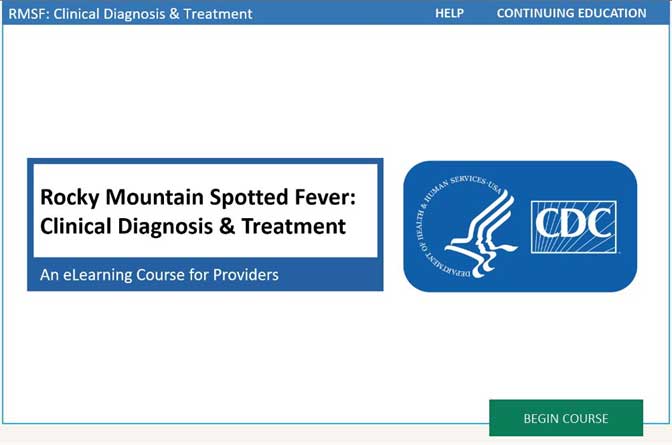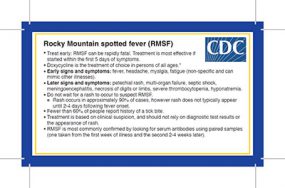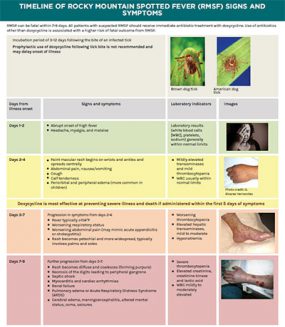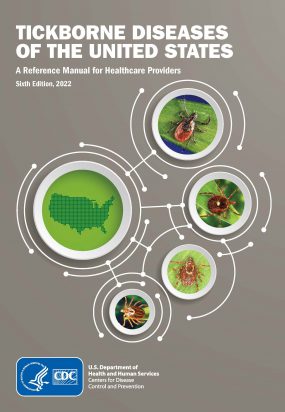Rocky Mountain Spotted Fever (and other tickborne diseases) Toolkit for Healthcare Providers
Rocky Mountain spotted fever (RMSF) is a potentially deadly tickborne disease in the United States. Between 3,000 and 7,000 cases of RMSF and other spotted fever rickettsioses are reported in the United States each year. Some severe infections can lead to lifelong disability and even death. Through awareness and early recognition, front line providers can reduce the morbidity and mortality associated with RMSF.
RMSF is a bacterial disease spread through the bite of an infected tick. Early symptoms include fever, headache, and rash; and prompt treatment with doxycycline is critical to prevent severe and fatal outcomes. This activity provides information pertinent to healthcare providers and public health practitioners on the epidemiology, risk factors, clinical characteristics, treatment, and diagnosis of RMSF. The toolkit includes an instructional video and companion learning tools that can be used as references. Many tickborne diseases contribute to illness and death in the United States, necessitating provider awareness.
The toolkit includes the following elements:
- Clinical Diagnosis and Treatment for Healthcare Providers training module: interactive clinical education tool provides free continuing education
- Training Video: narrated video discussing the clinical signs and symptoms, diagnosis, and treatment of RMSF
- Physician Pocket Card: quick reference of key facts about the clinical diagnosis and treatment of RMSF
- Clinical Timeline: printable graphic that provides key clinical facts and images to aid in the diagnosis of RMSF
- Tickborne Diseases of the United States Manual: manual for healthcare providers highlighting transmission, epidemiology, clinical, diagnostic, and treatment features for tickborne diseases throughout the country.
Narrated video discussing the clinical signs and symptoms, diagnosis, and treatment of RMSF
Quick reference of key facts about the clinical diagnosis and treatment of RMSF
Printable graphic that provides key clinical facts and images to aid in the diagnosis of RMSF
Manual for healthcare providers highlighting transmission, epidemiology, clinical, diagnostic, and treatment features for tickborne diseases throughout the country.
- Demma LJ, Traeger MS, Nicholson WL, et al. Rocky Mountain spotted fever from an unexpected tick vector in Arizona. N Engl J Med 2005;353:587–94.
- Elghetany MT, Walker DH. Hemostatic changes in Rocky Mountain spotted fever and Mediterranean spotted fever. Am J Clin Pathol 1999;112:159–68.
- Holman RC, Paddock CD, Curns AT, et al. Analysis of risk factors for fatal Rocky Mountain spotted fever: evidence for superiority of tetracyclines for therapy. J Infect Dis 2001;184:1437–44.
- Kirkland KB, Wilkinson WE, Sexton DJ. Therapeutic delay and mortality in cases of Rocky Mountain spotted fever. Clin Infect Dis 1995;20:1118–21.
- Massey EW, Thames T, Coffey CE, et al. Neurologic complications of Rocky Mountain spotted fever. South Med J 1985;78:1288–90, 1303.
- Paddock CD, Alvarez-Herandez G. Rickettsia rickettsii (Rocky Mountain spotted fever). In: Principles and Practice of Pediatric Infectious Diseases. 5th ed. Philadelphia, PA: Elsevier; 2017. p. 952-957.
- Regan JJ, Traeger MS, Humpherys D, et al. Risk factors for fatal outcome from Rocky Mountain spotted fever in a highly endemic area—Arizona, 2002–2011. Clin Infect Dis 2015;60:1659–66.
- Smithee L, et al. Public health reporting and national notification for spotted fever rickettsiosis (including Rocky Mountain spotted fever). Council of State and Territorial Epidemiologists, Infectious Diseases Committee, 2009 Position Statement [PDF – 13 pages]
- Todd SR, Dahlgren FS, et al. No visible dental staining in children treated with doxycycline for suspected Rocky Mountain spotted fever. J Pediatr 2015;166(5):1246-51
- Traeger MS, Regan JJ, Humpherys D, et al. Rocky Mountain spotted fever characterization and comparison to similar illnesses in a highly endemic area—Arizona, 2002–2011. Clin Infect Dis 2015;60:1650–8.




